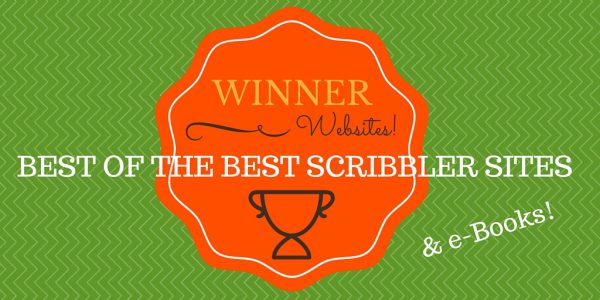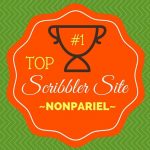
All Christians are in a state of flux…
ALREADY/NOT YET:
We are righteous already, but not yet. We are seated in the heavenlies already, but not yet. We are experiencing eternal life already, but not yet. We are sinless in God’s eyes, but not yet in the world’s eyes.
As writers, we also know we have never arrived, but are on a journey to continually improve our craft.
There is always more we can know and learn to improve our craft.
Below you will find the BEST OF THE BEST resources for “scribblers” out there. These are sites I have found particularly helpful. (But the web is vast and I certainly have not seen everything out there. Please send me more to add to the list.)
The FIRST set includes writing, editing, and submissions. The SECOND set is promotion and website related. The THIRD is writing-related e-books that are practical and useful.
Writing Top 20
-
-
 Well-Storied is an excellent guide for all stages of writing. Absolutely my favorite, winner of the Scribbler Site Nonpariel award. Practical and hands-on steps to create and fix your writing. –WINNER NONPARIEL–
Well-Storied is an excellent guide for all stages of writing. Absolutely my favorite, winner of the Scribbler Site Nonpariel award. Practical and hands-on steps to create and fix your writing. –WINNER NONPARIEL– - If you’re a Dramatica buff, you’ll want to definitely head on over to Narrative First, where you will learn the nitty-gritty of story telling. It can still help you if you don’t know or use Dramatica theory. But the best thing to do is go ahead and dive into Dramatica. (Don’t lose time–download the demo!)
- Subtext. This is a great resource for writing your story. Connected with Narrative First, Subtext helps you structure your story, matching the storyform to popular genres and movies. With or without a subscription Subtext is useful, but I recommend the subscription. Jim Hull is active in answering detailed questions, and also the writing tool is phenomenal!
- MacGregor Literary hosts Chip MacGregor’s blog chock-filled with useful specific pointers to improve the craft.
- Rachelle Gardner ‘s blog is full of resources for making your text submission-ready.
- Standout Books has great blog articles on writing, editing, blogging, you name it!
- ProWritingAid is an editing program that thoroughly points out flaws in your writing. Grammar, overused words, style, etc. (Read a detailed review of it here).
- Editminion is a web-based program that edits your chapters and text for standard writing errors, for free.
- Folded Story Fiction Style Guide Checklist
- Using Metaphors in Writing, Guide by Purdue University
- Absolute Write: Ten Quick Fixes
- Writing Geekery (ie: Finding a Juicy Secret for your Main Character)
- Janice Hardy’s Blog (ie: Real Life Diagnostics)
- Learned About Writing (ie: Ten Point Revision Strategy: RUE)
- Simple Writing (ie: Are “ing” Words Bad?)
- Now Novel is a great resource for character description (ie: Character Eyes)
- The Creative Penn (great links for all stages of the novel-write)
-
- Basic Plots in Literature (1plot, 3 plots, 7 plots, 20 plots, 36 plots; a breakdown of the different plots in literature.
—–>As an aside, see my post Writing with Children for how to apply these plots in a classroom situation!) - The Art of the Young Adult Novel is a keynote address by Stephen Roxburgh that sets out helpful pointers on this target-group.
- Jane Friedman’s site, including How to Find a Literary Agent for your Book
- . (send in your suggestions!)
Promotion & Platform
- Of course Writer’s Digest would have one of the best step-by-steps for Building an Author Website; also see How to Promote Your Book
- Your Writer Platform-Writer website basics
- The Writing Platform (How to Promote Your Book; also see Excellent-example Author Sites)
- Author Media‘s Top Website Mistakes is an important page to check out
- Traffic Cafe (ie: royalty free usage free photos; also tips for promoting your website)
- Reader submissions:
e-Books Top 10
-
- Writing the Breakout Novel (Donald Maass) I found this book almost too late, but just in time. If you use this as you are working on your first edit, you will find you write 1) what the reading public is looking for, 2) what agents are looking for and 3) what you want to be writing anyway. Donald Maass has set out details that are essential to actually SELL the book. (On the other hand, if you find it after you think you’re done…well, it’s never too late!)
- The Art & Craft of Writing Christian Fiction (Jeff Gerke) This is a companion piece to Writing the Breakout Novel, because Christian writers especially, more than it being “breakout” want their craft to Glorify God. This book walks the Christian novelist through the additional issues facing Christian writers.
- APE: Author Publisher Entrepreneur-How to Publish a Book (Guy Kawasaki) This book walks you through the idea of self-publishing from start to finish. If you are throwing around the idea of self-publishing, make sure to read this.
- The Emotion Thesaurus: A Writer’s Guide to Character Expression (Angela Ackerman and Becca Puglisi)
- Master Lists for Writers (Bryn Donovan)
- In a Nutshell Series (Jessica Bell): Show & Tell, The Six Senses, Adverbs & Cliches
- How to Write Dazzling Dialogue (James Scott Bell)
- (send in your favorites).
Action Point:
Which site or books have you found particularly helpful? I’d love to check it out and perhaps add it to this list.
Make a comment HERE and let us know!


